Unit 10 If you go to the party, you'll have a great time Section A 课件(共31张PPT,无音频)初中英语人教版八年级上册
文档属性
| 名称 | Unit 10 If you go to the party, you'll have a great time Section A 课件(共31张PPT,无音频)初中英语人教版八年级上册 | 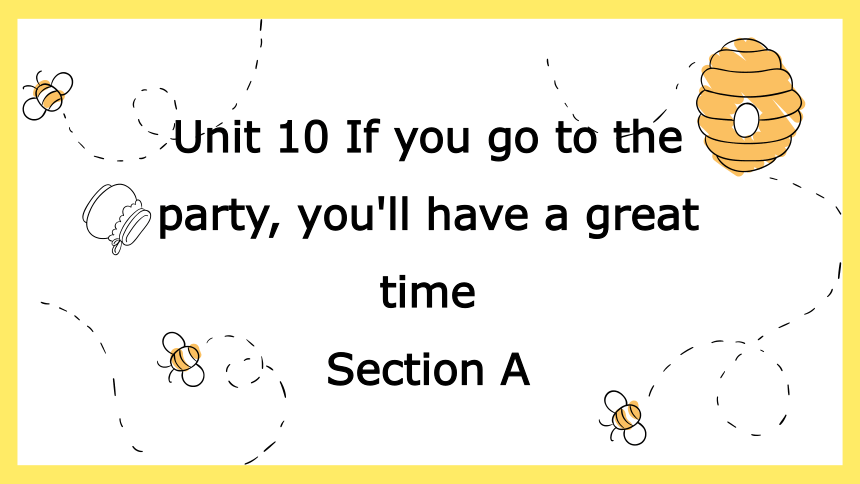 | |
| 格式 | pptx | ||
| 文件大小 | 2.6MB | ||
| 资源类型 | 教案 | ||
| 版本资源 | 人教新目标(Go for it)版 | ||
| 科目 | 英语 | ||
| 更新时间 | 2023-11-23 11:12:59 | ||
图片预览

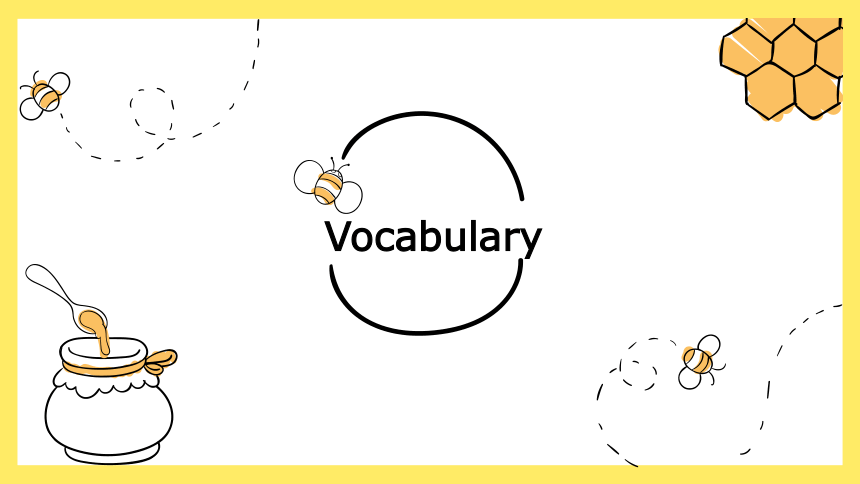
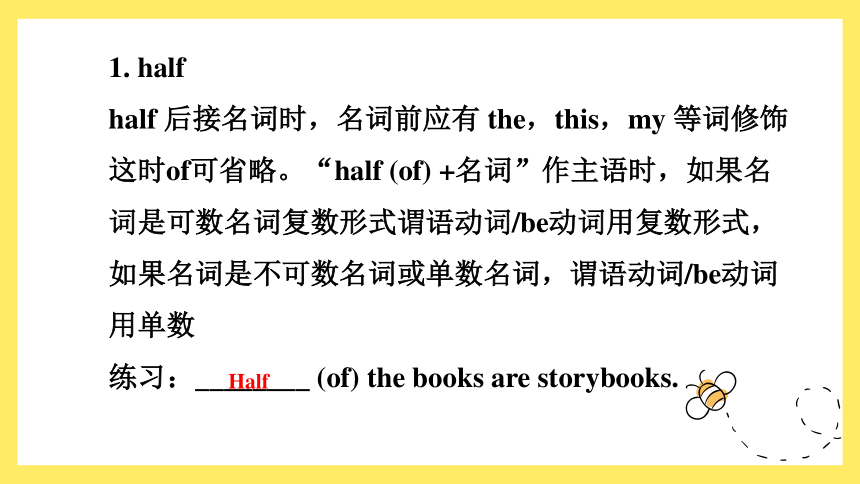
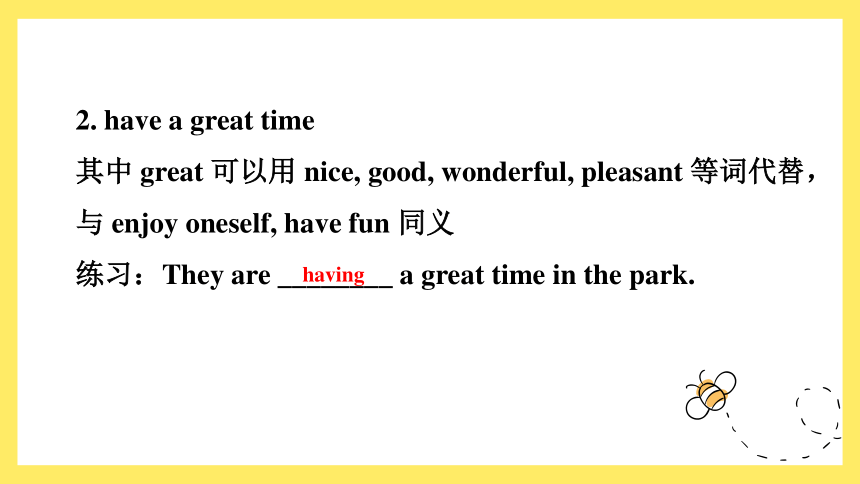

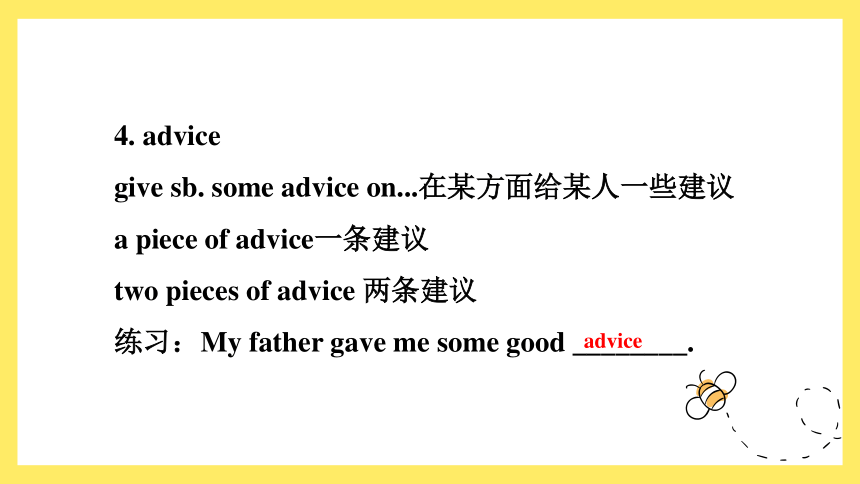

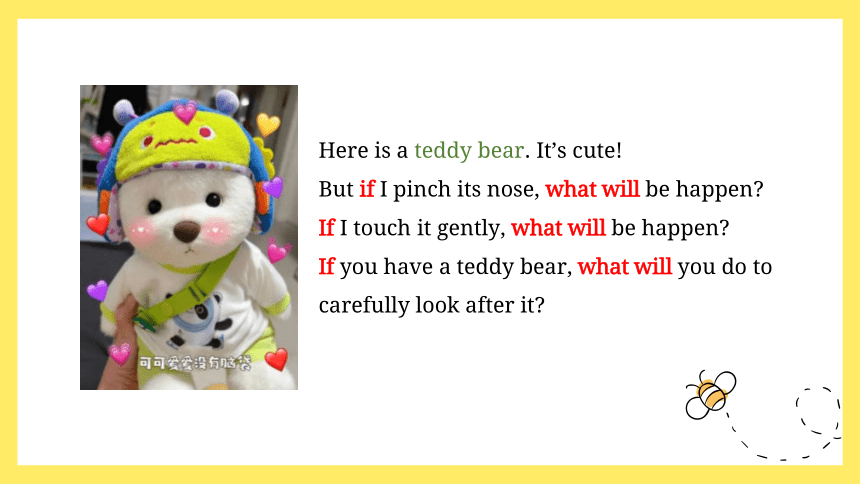
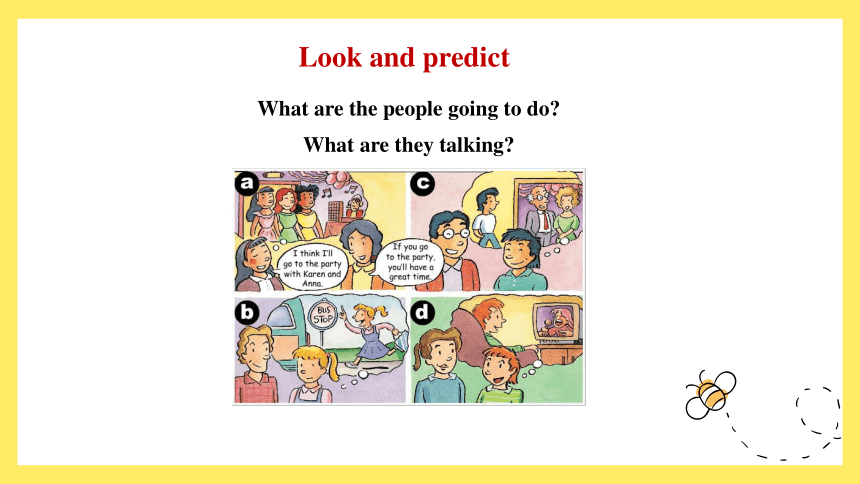
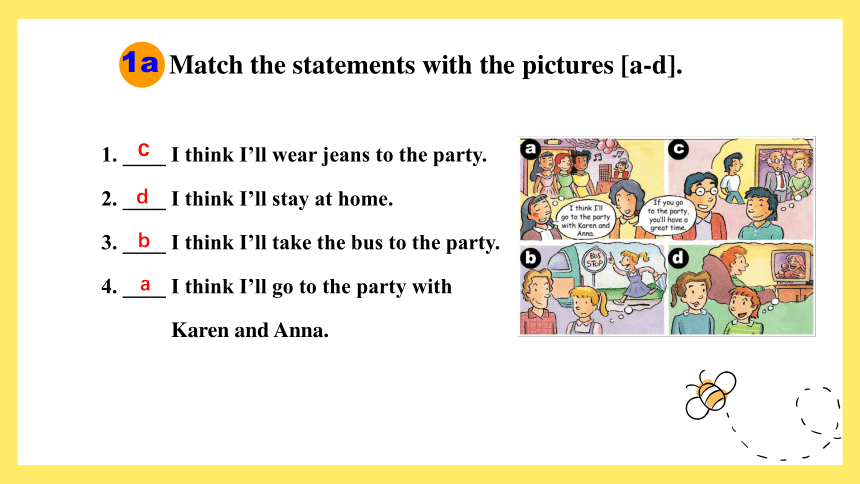
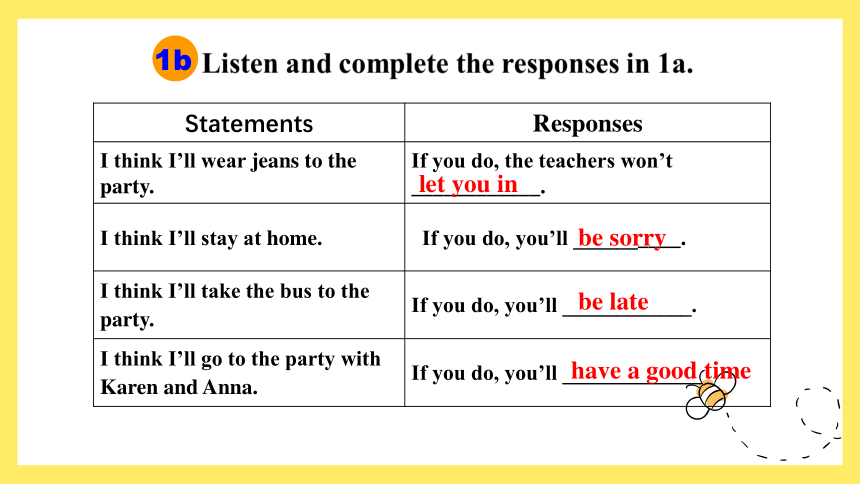
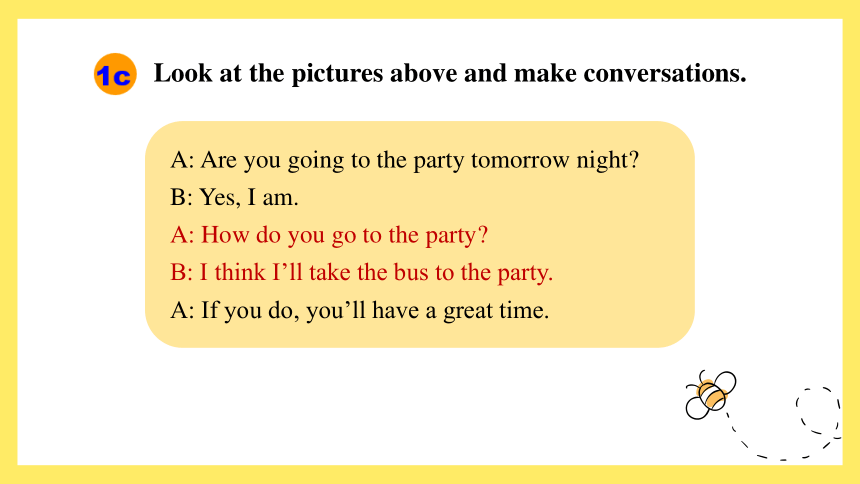
文档简介
(共31张PPT)
Unit 10 If you go to the party, you'll have a great time
Section A
Vocabulary
1. half
half 后接名词时,名词前应有 the,this,my 等词修饰这时of可省略。“half (of) +名词”作主语时,如果名词是可数名词复数形式谓语动词/be动词用复数形式,如果名词是不可数名词或单数名词,谓语动词/be动词用单数
练习:________ (of) the books are storybooks.
Half
2. have a great time
其中 great 可以用 nice, good, wonderful, pleasant 等词代替,与 enjoy oneself, have fun 同义
练习:They are ________ a great time in the park.
having
3. order
order sth.from...结构,意为“从......订购某物”
order sb.to do sth意为“命令某人做某事”
order可构成 in order to 或 in order that...结构,意为“为了......”
练习:I ________ some clothes from that shop.
ordered
4. advice
give sb. some advice on...在某方面给某人一些建议
a piece of advice一条建议
two pieces of advice 两条建议
练习:My father gave me some good ________.
advice
Lead-in
Here is a teddy bear. It’s cute!
But if I pinch its nose, what will be happen
If I touch it gently, what will be happen
If you have a teddy bear, what will you do to carefully look after it
Look and predict
What are the people going to do
What are they talking
1a
Match the statements with the pictures [a-d].
1. ____ I think I’ll wear jeans to the party.
2. ____ I think I’ll stay at home.
3. ____ I think I’ll take the bus to the party.
4. ____ I think I’ll go to the party with
Karen and Anna.
c
d
b
a
1b
Statements Responses
I think I’ll wear jeans to the party. If you do, the teachers won’t ____________.
I think I’ll stay at home. If you do, you’ll __________.
I think I’ll take the bus to the party. If you do, you’ll ____________.
I think I’ll go to the party with Karen and Anna. If you do, you’ll _____________
let you in
be sorry
be late
have a good time
Look at the pictures above and make conversations.
A: Are you going to the party tomorrow night
B: Yes, I am.
A: How do you go to the party
B: I think I’ll take the bus to the party.
A: If you do, you’ll have a great time.
A: Are you going to the party
tomorrow night
B: Yes, I am. / No, I’m not.
A: …
B: ...
A: If you do, you’ll ...
2a
Listen and circle the correct answers to complete the sentences.
1. The students are talking about
when to have (a class party/ a
class meeting/ a birthday party).
2. They plan to have it on (Friday
evening / Saturday afternoon /
Saturday evening).
2b
Listen again. Choose the correct short answer in the box to answer each question.
half the class won’t come
some students will be bored
make some food
students will leave early
the party games
1.What will happen if they have the party today
_______________________________________
2.What will happen if they have the party tomorrow
_______________________________________
3.What will happen if they watch a video at the party
_______________________________________
4.What will Mark organize
_______________________________________
5.What will Nelly do
_______________________________________
Half the class won’t come.
Students will leave early to study for the test.
Some students will be bored.
He will organize the party games.
She will make some food.
2c
Role-play a conversation between Nelly and Mark.
Role-play the conversation.
2d
Jeff: Hey, Ben. For the party next week, should we ask people to bring food
Ben: No, let’s order food from a restaurant. If we ask people to bring food,
they’ll just bring potato chips and chocolate because they’ll be too lazy
to cook.
Jeff: OK. For the games, do you think we should give people some small
gifts if they win
Ben: I think that’s a great idea! If we do that, more people will want to play
the games.
Jeff: Yes, the games will be more exciting, too.
1.If you go to the party, you’ll have a great time. 如果你去参加聚会,你
会玩得很开心。
(1)本句是一个含有条件状语从句的复合句,if 引导条件状语从句,
you’ll have a great time 为主句。若主句的时态为一般将来时,if 引导的
条件状语从句用一般现在时表示将来。
e.g. If it doesn’t rain tomorrow, I’ll go to the park.
如果明天不下雨,我就去公园。
(2)have a great time 意为“玩得开心;过得愉快”。其同义短语有
have a good/nice time, enjoy oneself 等。
e.g. We had a great time in Hainan. 我们在海南玩得很开心。
2.I think I’ll wear jeans to the party. 我想我会穿牛仔裤去参加聚会。
本句为复合句,I think 后接宾语从句,其中引导词 that 在口语中常
省略。主句的时态为一般现在时,从句可根据实际情况来确定时态。
e.g. I think (that) he left yesterday morning. 我想他昨天早晨就离开了。
3.If you do, the teachers won’t let you in. 如果这样,老师们不会让你进去。
句中 do 代替上文的 wear jeans to the party。英语中,为避免动词的
重复,常以 do、does 或 did 代替前文所用的实义动词。此时,要注意数
和时态的变化!
e.g. John jumps higher than I do. 约翰跳得比我高。
4.The students are talking about when to have (a class party/a class
meeting/a birthday party). 学生们正在谈论什么时候举办(班级聚会/
班会/生日聚会)。
(1)句中 when to have ... 是“疑问词 + 动词不定式”结构,做 talk about
的宾语,可转换为宾语从句 when they will have ...
e.g. We haven’t decided when to start yet. 我们还没决定什么时候开始。
(2)meeting 名词,意为“会议;集会;会面”。常用短语 have a
meeting 意为“举行会议”。
e.g. We’ll have a meeting sometime next week.
下周的某个时候我们将举行会议。
Grammar Focus
Grammar Focus
一、if引导的条件状语从句
if意为“如果”,引导条件状语从句时,既可放在主句前面,也可放在主句后面若条件句放在句首,从句后面要加逗号与主句隔开
例:If you go there,I'll go,too.如果你去那儿,我也会去
My mother will take me to the park if she is free
如果我妈妈有空,她就会带我去公园
1时态运用
在含有引导的条件状语从句的主从复合句中,主句为下列情形之一的,条件状语从
句要用一般现在时
(1)主句是一般将来时
例: If he comes, he will bring his violin.
如果他来,他就会带来他的小提琴
(2)主句谓语含有情态动词 may/ might/can/must/ should等
例: If you want to lose weight, you must eat less meat.
如果你想减肥,你必须少吃肉。
(3)主句是祈使句。
例: If you are not strong enough, please don't take part in such an activity.
如果你不够强壮,请不要参加这种活动。
2句型转换
(1)借助“祈使句+and/or+句子 (一般将来时)”这一句型来转换。其中,在句意上and 表示顺承;or 表示转折,意为“否则”
例: If you study hard, you'll pass the exam easily. =Study hard, and you'll
pass the exam easily.努力学习,你将很容易通过考试
(2)借助 without或with 来转换条件状语从句
例: If there is no water, fish will die. =Fish will die without water
如果没有水,鱼将会死。
If you help me, I'll finish the work soon.=With your help, I'll finish the work soon.如果你帮助我,我将很快完成工作。
二、should的用法
1用法
should 为情态动词,意为“应该;应当”,后接动词原形,无人称和数的变化。常用来表示征询意见、建议、劝告、要求和义务等
(1)should 意为“应该”,表示劝告或建议
例: You should stop playing computer games.你应该停止玩电脑游戏
(2)should 表示要求或命令
例: You shouldn't fight with your classmate.你不应该和同学打架
(3)should 表示预测或可能。
例: His schoolbag should be in the classroom.他的书包可能在教室里
(4)should 有时表示说话人的感情,如惊讶、愤怒、失望等
例:Why should I go 为什么是我去
2基本式
(1)肯定句
Sb+ should+动词原形+其他
例: We should obey traffic rules. 我们应该遵守交通规则。
(2)否定句
Sb.shouldn't+动词原形+其他
例: You shouldn't smoke in the hospital.你不应该在医院里吸烟。
(3)一般疑问句
Should sb+动词原形+其他
例: Should you come here tonight 今晚你应该来这里吗
3a
Read the passage quickly and find out the answers below.
Who wrote this letter
Who is the letter for
Why does the person write the letter
What are some worries the person has
Tina.
Su Mei.
She wants to ask for some advice on Mike’s birthday party.
To go or not to go; What to wear; How to get there.
Dear Su Mei,
I don’t ______(know) what to _____(do) about going to Mike’s birthday party tomorrow night. My parents ______(think) I should study for my English exam next week. If I ______(go) to the party, they ________(be) upset. Mike ______(tell) us to wear nice clothes, but I don’t ______(have) any. If I _____(wear) jeans, I _________(look) the worst. Also, I’m not sure how to ____(go) to the party. If I ______(walk), it ________(take) me too long. If I ______(take) a taxi, it ________(be) too expensive. Can you give me some advice please
Tina
know
do
think
go
will be
told
have
wear
will look
go
walk
will take
take
will be
3b
Complete the sentences using your own ideas.
1. If I get up late tomorrow, _____________________________.
2. If I don’t finish my homework, _________________________.
3. If I don’t get enough exercise, _________________________.
4. I will not have enough time to study if ____________________.
5. I will not make any friends if ____________________.
3c
Write a story with your group on a piece of paper. The
first person begins the story with “I think I will …”
The others add sentences with “if”. Pass the paper around
twice. Then read the story.
I think I will go to the movies tonight. If I go to the movies, I won’t finish my homework. If I don’t finish my homework …
Thank you
Unit 10 If you go to the party, you'll have a great time
Section A
Vocabulary
1. half
half 后接名词时,名词前应有 the,this,my 等词修饰这时of可省略。“half (of) +名词”作主语时,如果名词是可数名词复数形式谓语动词/be动词用复数形式,如果名词是不可数名词或单数名词,谓语动词/be动词用单数
练习:________ (of) the books are storybooks.
Half
2. have a great time
其中 great 可以用 nice, good, wonderful, pleasant 等词代替,与 enjoy oneself, have fun 同义
练习:They are ________ a great time in the park.
having
3. order
order sth.from...结构,意为“从......订购某物”
order sb.to do sth意为“命令某人做某事”
order可构成 in order to 或 in order that...结构,意为“为了......”
练习:I ________ some clothes from that shop.
ordered
4. advice
give sb. some advice on...在某方面给某人一些建议
a piece of advice一条建议
two pieces of advice 两条建议
练习:My father gave me some good ________.
advice
Lead-in
Here is a teddy bear. It’s cute!
But if I pinch its nose, what will be happen
If I touch it gently, what will be happen
If you have a teddy bear, what will you do to carefully look after it
Look and predict
What are the people going to do
What are they talking
1a
Match the statements with the pictures [a-d].
1. ____ I think I’ll wear jeans to the party.
2. ____ I think I’ll stay at home.
3. ____ I think I’ll take the bus to the party.
4. ____ I think I’ll go to the party with
Karen and Anna.
c
d
b
a
1b
Statements Responses
I think I’ll wear jeans to the party. If you do, the teachers won’t ____________.
I think I’ll stay at home. If you do, you’ll __________.
I think I’ll take the bus to the party. If you do, you’ll ____________.
I think I’ll go to the party with Karen and Anna. If you do, you’ll _____________
let you in
be sorry
be late
have a good time
Look at the pictures above and make conversations.
A: Are you going to the party tomorrow night
B: Yes, I am.
A: How do you go to the party
B: I think I’ll take the bus to the party.
A: If you do, you’ll have a great time.
A: Are you going to the party
tomorrow night
B: Yes, I am. / No, I’m not.
A: …
B: ...
A: If you do, you’ll ...
2a
Listen and circle the correct answers to complete the sentences.
1. The students are talking about
when to have (a class party/ a
class meeting/ a birthday party).
2. They plan to have it on (Friday
evening / Saturday afternoon /
Saturday evening).
2b
Listen again. Choose the correct short answer in the box to answer each question.
half the class won’t come
some students will be bored
make some food
students will leave early
the party games
1.What will happen if they have the party today
_______________________________________
2.What will happen if they have the party tomorrow
_______________________________________
3.What will happen if they watch a video at the party
_______________________________________
4.What will Mark organize
_______________________________________
5.What will Nelly do
_______________________________________
Half the class won’t come.
Students will leave early to study for the test.
Some students will be bored.
He will organize the party games.
She will make some food.
2c
Role-play a conversation between Nelly and Mark.
Role-play the conversation.
2d
Jeff: Hey, Ben. For the party next week, should we ask people to bring food
Ben: No, let’s order food from a restaurant. If we ask people to bring food,
they’ll just bring potato chips and chocolate because they’ll be too lazy
to cook.
Jeff: OK. For the games, do you think we should give people some small
gifts if they win
Ben: I think that’s a great idea! If we do that, more people will want to play
the games.
Jeff: Yes, the games will be more exciting, too.
1.If you go to the party, you’ll have a great time. 如果你去参加聚会,你
会玩得很开心。
(1)本句是一个含有条件状语从句的复合句,if 引导条件状语从句,
you’ll have a great time 为主句。若主句的时态为一般将来时,if 引导的
条件状语从句用一般现在时表示将来。
e.g. If it doesn’t rain tomorrow, I’ll go to the park.
如果明天不下雨,我就去公园。
(2)have a great time 意为“玩得开心;过得愉快”。其同义短语有
have a good/nice time, enjoy oneself 等。
e.g. We had a great time in Hainan. 我们在海南玩得很开心。
2.I think I’ll wear jeans to the party. 我想我会穿牛仔裤去参加聚会。
本句为复合句,I think 后接宾语从句,其中引导词 that 在口语中常
省略。主句的时态为一般现在时,从句可根据实际情况来确定时态。
e.g. I think (that) he left yesterday morning. 我想他昨天早晨就离开了。
3.If you do, the teachers won’t let you in. 如果这样,老师们不会让你进去。
句中 do 代替上文的 wear jeans to the party。英语中,为避免动词的
重复,常以 do、does 或 did 代替前文所用的实义动词。此时,要注意数
和时态的变化!
e.g. John jumps higher than I do. 约翰跳得比我高。
4.The students are talking about when to have (a class party/a class
meeting/a birthday party). 学生们正在谈论什么时候举办(班级聚会/
班会/生日聚会)。
(1)句中 when to have ... 是“疑问词 + 动词不定式”结构,做 talk about
的宾语,可转换为宾语从句 when they will have ...
e.g. We haven’t decided when to start yet. 我们还没决定什么时候开始。
(2)meeting 名词,意为“会议;集会;会面”。常用短语 have a
meeting 意为“举行会议”。
e.g. We’ll have a meeting sometime next week.
下周的某个时候我们将举行会议。
Grammar Focus
Grammar Focus
一、if引导的条件状语从句
if意为“如果”,引导条件状语从句时,既可放在主句前面,也可放在主句后面若条件句放在句首,从句后面要加逗号与主句隔开
例:If you go there,I'll go,too.如果你去那儿,我也会去
My mother will take me to the park if she is free
如果我妈妈有空,她就会带我去公园
1时态运用
在含有引导的条件状语从句的主从复合句中,主句为下列情形之一的,条件状语从
句要用一般现在时
(1)主句是一般将来时
例: If he comes, he will bring his violin.
如果他来,他就会带来他的小提琴
(2)主句谓语含有情态动词 may/ might/can/must/ should等
例: If you want to lose weight, you must eat less meat.
如果你想减肥,你必须少吃肉。
(3)主句是祈使句。
例: If you are not strong enough, please don't take part in such an activity.
如果你不够强壮,请不要参加这种活动。
2句型转换
(1)借助“祈使句+and/or+句子 (一般将来时)”这一句型来转换。其中,在句意上and 表示顺承;or 表示转折,意为“否则”
例: If you study hard, you'll pass the exam easily. =Study hard, and you'll
pass the exam easily.努力学习,你将很容易通过考试
(2)借助 without或with 来转换条件状语从句
例: If there is no water, fish will die. =Fish will die without water
如果没有水,鱼将会死。
If you help me, I'll finish the work soon.=With your help, I'll finish the work soon.如果你帮助我,我将很快完成工作。
二、should的用法
1用法
should 为情态动词,意为“应该;应当”,后接动词原形,无人称和数的变化。常用来表示征询意见、建议、劝告、要求和义务等
(1)should 意为“应该”,表示劝告或建议
例: You should stop playing computer games.你应该停止玩电脑游戏
(2)should 表示要求或命令
例: You shouldn't fight with your classmate.你不应该和同学打架
(3)should 表示预测或可能。
例: His schoolbag should be in the classroom.他的书包可能在教室里
(4)should 有时表示说话人的感情,如惊讶、愤怒、失望等
例:Why should I go 为什么是我去
2基本式
(1)肯定句
Sb+ should+动词原形+其他
例: We should obey traffic rules. 我们应该遵守交通规则。
(2)否定句
Sb.shouldn't+动词原形+其他
例: You shouldn't smoke in the hospital.你不应该在医院里吸烟。
(3)一般疑问句
Should sb+动词原形+其他
例: Should you come here tonight 今晚你应该来这里吗
3a
Read the passage quickly and find out the answers below.
Who wrote this letter
Who is the letter for
Why does the person write the letter
What are some worries the person has
Tina.
Su Mei.
She wants to ask for some advice on Mike’s birthday party.
To go or not to go; What to wear; How to get there.
Dear Su Mei,
I don’t ______(know) what to _____(do) about going to Mike’s birthday party tomorrow night. My parents ______(think) I should study for my English exam next week. If I ______(go) to the party, they ________(be) upset. Mike ______(tell) us to wear nice clothes, but I don’t ______(have) any. If I _____(wear) jeans, I _________(look) the worst. Also, I’m not sure how to ____(go) to the party. If I ______(walk), it ________(take) me too long. If I ______(take) a taxi, it ________(be) too expensive. Can you give me some advice please
Tina
know
do
think
go
will be
told
have
wear
will look
go
walk
will take
take
will be
3b
Complete the sentences using your own ideas.
1. If I get up late tomorrow, _____________________________.
2. If I don’t finish my homework, _________________________.
3. If I don’t get enough exercise, _________________________.
4. I will not have enough time to study if ____________________.
5. I will not make any friends if ____________________.
3c
Write a story with your group on a piece of paper. The
first person begins the story with “I think I will …”
The others add sentences with “if”. Pass the paper around
twice. Then read the story.
I think I will go to the movies tonight. If I go to the movies, I won’t finish my homework. If I don’t finish my homework …
Thank you
同课章节目录
- Unit 1 Where did you go on vacation?
- Section A
- Section B
- Unit 2 How often do you exercise?
- Section A
- Section B
- Unit 3 I'm more outgoing than my sister.
- Section A
- Section B
- Unit 4 What's the best movie theater?
- Section A
- Section B
- Unit 5 Do you want to watch a game show?
- Section A
- Section B
- Unit 6 I'm going to study computer science.
- Section A
- Section B
- Unit 7 Will people have robots?
- Section A
- Section B
- Unit 8 How do you make a banana milk shake?
- Section A
- Section B
- Unit 9 Can you come to my party?
- Section A
- Section B
- Unit 10 If you go to the party, you'll have a grea
- Section A
- Section B
